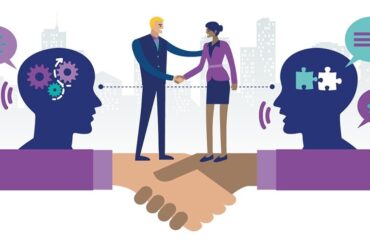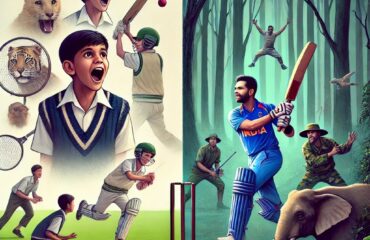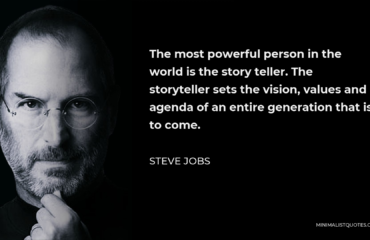
We have heard of several small instances which bring about a drastic change in a person and sets about bringing out skill sets in the person which probably even he or she never knew existed within them.
The best example that comes to mind is the incident in Gandhiji’s life in South Africa where while travelling in the first-class coach of the train with a first-class ticket he gets thrown out from the train because of the color of his skin. This instance changes Gandhi who had gone to South Africa to work as a barrister and with no political experience till then into an activist in South Africa to start with and then after coming back to India to lead India’s freedom struggle. The struggle which under his leadership led to the freedom of India the crown jewel of the British kingdom.
It’s not that this one incident brought out all the leadership skills in Gandhiji. Am sure there are several more small and big incidents which followed which made him into what he was. It’s not that these things happen only with famous and great leaders. If we look at several of our key skill sets and talents that make us what we are we would also think of incidents which would have triggered the start of a habit that has today become a daily routine for us.
I remember the first time I was deputed to Mumbai at the start of my career to take care of a huge backlog of consumer complaints which had come about due to heavy rains and flooding. Since this was before the time of mobiles all escalated customer calls which the front office team couldn’t handle for my area would get connected to me. In addition, there would be a huge number of escalated cases which the front office would have managed to handle on some commitment. This was in addition to the more than normal workload of complaints which were there. What also made matters worse was you weren’t sitting in a desk and doing things. You would troubleshoot on something, go, and meet a customer who had come to the office and demanded meeting someone and so on. What used to happen in all this moving around was that I would miss to meet some consumer commitment that I had given because I had lost track of them.
Being fresh out of college I was full of enthusiasm and enjoying the new job and responsibility but managing some of those irate customers did test out my convincing skills at that young age. We were doing a good job and me and my team were managing to keep things at a stable level though far away compared to a steady state of operations.
So, one such day I missed resolving or getting back to one of the consumers I had spoken to, and it got escalated to a much higher level. I remember our Mumbai Branch Manager my reporting boss at that time giving me a dressing down. After he finished, he took out a new diary and told me to always carry it with me even within office so that even if spoke to customer while I was somewhere else, I could still write the same down for reference and closure later.
To till this day, I have the same habit and has been one of the reasons for the meticulous follow up that I am able to do to ensure things are taken to closure. I have also at my level inculcated these habits in so many people who have worked with me during the various years across different organizations and locations and am sure it has helped all of them.
There are many more such small instances in my life and career which have influenced the way I have become and am sure it’s there in the lives of every one of us. There would also be a mix of traumatic and positive experiences both of which would have influenced us all in the same way. Such experiences are often referred to as crucibles after the vessels that medieval humans used to turn base metals into gold.
A crucible is a transformative experience through which an individual come through which gives them a new and altered sense of identity. The transformation might not be immediately visible to the eternal world but usually sets off a process which over a longer period leads to dramatic change…These crucibles are opportunities for reinvention.
What is very interesting is the person suddenly finds a different meaning in lot of normal experiences compared to before as it has reshaped those persons normal. The experience could vary from surviving a deadly disease or managing in a new geography or a new boss or a new culture. It could be ragging, a new experience or the influence of a positive person or the strong backing of a team.
What is also interesting is that while some people realize a certain skill after going through an experience a good majority might not even understand or relate to some of these experiences or might not survive them to learn from them.
So, what are some of the skills that enable some people to not only go through and come out successfully from some of these experiences but also build in lifetime learnings which get inculcated into their future?
- Adaptive Quotient (AQ)
With the kind of change that we have been going through and the kind of change that is expected in the next 10 years which would be equal to or more than the change that has happened in the earlier 100 years this becomes, and even more critical skill set to have.
Adaptive quotient also goes up when we build a very high skill of
- Unlearning and learning
Unlearning is critical if we need to build new skills and adapt to environment and cultures which we aren’t used to. Mahatma Gandhi often used to refer to reducing his mindset to zero as one of his goals which actually means unlearning everything that is learned.
- High urge for self-development, curiosity, and exploration
There is often talked about example of Robert Galvin former Motorola chairman who even in his 70s would spend his weekends wind surfing.
- Applied Creativity
Let me explain Applied creativity with the example of the movie Fantasia.
Released in 1940, the movie represented Walt Disney’s boldest experiment till then. What had begun as a vehicle to enhance Mickey Mouse’s career blossomed into a full-blown feature that remains unique in the history of animation.
What made it also special was it was the first film to use stereophonic sound. The scope and soundstage of Fantasia were too grand for the standard theatre setup of 1940, but instead of making a film that worked within the limitations of the technology, Disney and his team had to develop a way to upgrade theatres to match the concert experience of the film. So this involved installing more speakers around the room instead of the few that were typically placed behind the screen (the installation at the Broadway Theatre in New York included 90 speakers), as well as new projectors and sound reproduction machines. The estimated cost for the upgrades was around $85,000 per theatre, in the 1940s…
But then Walt Disney realised that theatres had lot of limitations and rules many of which he couldn’t control. To give the real-life experience that he wanted to he came out with his next Applied creativity idea which was Disneyland where all the 2D characters in the movie move to 3D with different houses for the different settings.
- Hardiness
This stands for people who have the perseverance and toughness to come out of any circumstances without losing hope. The best example which is very widely quoted is that of Abraham Lincoln which I quote again as below which clearly brings out what hardiness stands for
1832 – Lost Job. Lost to state legislature
1833 – Failed in business
1836 – Had nervous breakdown
1838 – Defeated for speaker
1843 – Defeated for nomination to Congress
1854 – Defeated for US senate
1856 – Defeated for vice president nomination
1858 – Defeated for US Senate
1860 – Elected President
Before I conclude I remember the famous Steve Jobs speech at Stanford in 2005 where he talked about looking back and connecting the various dots that has made us reach where we are today.
Am sure we will all find several such crucible experiences at various points of our life which has made each one of us the leaders that we are today in our lives and careers…
To keep hearing more such connecting the dot updates, do connect with me here.



